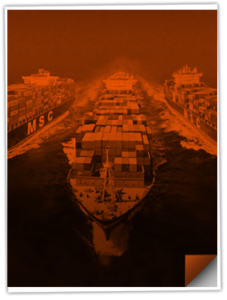Featured Headlines:
Certain Changes Coming to eCert Process
US Export Controlled Substances and Aircraft
NY's Empty Threats Not Coming Up Empty
Don’t Let Your Food Expire!
- The US Food and Drug Administration’s (FDA) food facility registration renewal kicks off on October 1, 2022 and will continue through December 31st.
- During this time, all food facilities must submit a timely renewal, or the product will be denied entry into the US; please also note the following:
- As part of the renewal, a Data Universal Numbering System (DUNS) number for the food facility must also be provided.
- The name and contact information on the registration must exactly match the information on the DUNS number—if it doesn’t, the registration will be cancelled.
- For more helpful tips, check out the FDA webinar; or click here to learn more.
APHIS Gets Racy With Lacey
- In October, the US Animal and Plant Health Inspection Service (APHIS) will begin a year-long outreach to alert the trade community of the upcoming declaration requirement for non-composite wood products.
- A list of affected harmonized tariff schedule (HTS) codes will be released following the 12-month period—which is expected to be published in November or December of 2023.
- According to APHIS, phase 7 should be fully implemented by summer of 2024, at which time officials hope to immediately pivot into an eighth and final phase, which will cover “all remaining composite material.”
- Stay tuned for more updates on phase 7 and 8 of the Lacey Act!
Certain Changes Coming to eCert Process
- US Customs and Border Protection (CBP) will deploy Electronic Certification System (eCERT) 2.0 enhancements to the Automated Commercial Environment (ACE) on September 24, 2022.
- eCERT 2.0 will enhance the existing features by adding validations to verify authorized use of export certificates, automating the decrementing and incrementing of export certificate usage, and enabling users to query export certificate usage.
- The new system will also require the participating overseas exporting country to provide the Importer of Record (IOR) as part of the eCERT transmission to CBP.
- For more information on the upcoming changes, click here.
That Sassy Chassis
- In a bit of a shocker, intermodal equipment providers have publicly contended that the US supply of chassis will be sufficient in 2023. After the spokesperson was drug tested, he defended this position by pointing to street dwell time as the real supply chain disease in the US transportation patient.
- A poignant example is Southern California where Flex-Van, DCLI, and TRAC Intermodal report that average street dwell for 40’s is currently 11 days while the system only works if that dwell is a max of four days. Youch!
- Honestly, the commentary of chassis providers provokes some skepticism for us. This is mainly because, when asked about improved industry efficiency, they pointed to “gray pools, neutral pools, private pools, or no pools at all.” Okay, maybe it really is all of those things and choosing how to manage each local reality, but it sounds like choosing turkey, prime rib, salmon, goose, and vegan joy for Thanksgiving dinner to us. We all know you get TWO main courses, not twenty!
- What else we all know is that congestion at ramps and ports has been tremendously amplified by current US chassis shortages, and we already knew about every form of pool or non-pool out there! That said, we certainly remain hopeful that today’s dysfunction is less about supply than the recent demand for short-term storage inside loaded containers.
US Export Controlled Substances and Aircraft
- Following similar moves by the European Union (EU), the US has chosen to strictly limit the export of fentanyl, fentanyl precursor chemicals, and related chemicals to Russia.
- EU officials said that these substances “have been used as toxic chemicals in the past by Russia.” The controls extend to Russia’s ally, Belarus.
- The fentanyl announcement came at the same time as the launch of new export controls for quantum computing technology. Additionally, the US has sanctioned additional executives in Russia’s financial sector while also adopting new sanctions on people accused of human rights abuses in support of Putin’s war in the Ukraine.
- Three 747 freighter aircraft from Iran have been added to the naughty list by the US Commerce Department after serving the Russian market.
- The three airplanes, operated by Mahan Air, Qeshm Fars Air, and Iran Air, are believed to have carried electronics to Russia in violation of US export controls.
- The Commerce Department has repeated its warning that any refueling, maintenance, repair, spare parts, or air services inside Russia violate export controls and subject companies to US enforcement actions.
A Glob of Global News
- The Suez Canal has announced 15% fee increases for all crossing times beginning in 2023. In a somewhat bizarre press release, port authorities reminded the shipping public that the Suez makes it faster and cheaper on fuel than going around Africa… isn’t that why there IS a Suez Canal? The Canal authority also said that they kind of miss all the attention they got during the Ever Given’s gigantic “wedgie.”
- Germany appears to be getting cold feet as COSCO looks to finalize the acquisition of a 35% stake in Tollerort at the port of Hamburg, in what would be the first foreign investment since May 7th, 1189 when the famous port was first built. Hamburg is Germany’s largest port, and German lawmakers are again reviewing the deal with an eye on their Foreign Trade Act. While there are three theories on the origin of the phrase “getting cold feet,” it is appropriate that one likely source is the German novelist, Fritz Reuter.
- “Just one more thing”: watch out Colombo! Yes, that was actually a Lt. Columbo quote for our older readers! Colombo, Sri Lanka has long been the dominant ocean port in the Indian Subcontinent, but officials in India are looking to change that. They have allowed and provided for cargo from Bangladesh to arrive at Kolkata or Haldia in the west by sea (barge or feeder) and then rail to Jawaharlal and Mundra in the east for transshipment.
The Air Share
- The average rate for airfreight globally dropped below 2021 YoY for the first time this year in September, and it now sits about 3.5% lower than 2021 comps.
- In the past two weeks alone, industry chargeable kilos are down 5% vs. four weeks ago, and this has pushed the 2022 overall performance to 11% lower than 2021 YTD.
- As we have said in the past, the growing availability of passenger belly space has increased broader capacity, and that measure now sits up 7% vs. 2021.
- While the first three bullets here do not exactly lead to the image of airline executives dancing merrily as they tickle each other with $100 bills, we should remind ourselves of one of the positives from the pandemic era. The total collapse of the passenger market forced air carriers to innovate to survive. They put sophisticated electronic booking capabilities in place to allow for true capacity-based rates with real-time availability. Essentially, airlines are much more efficient at using and rating their capacity, and we have witnessed greatly improved load factors as a result. This is a true case of making the sweet lemonade of efficiency out of the sour lemons of Covid.
NY's Empty Threats Not Coming Up Empty
- Despite the delay in launching their controversial $100/container penalty, The Port of NY/NJ (PANYNJ) has witnessed tremendous improvements in the evacuation of empties. And, it’s about time! Over 200,000 empties are floating around the region exposed to the elements, hungry, and homesick.
- Let’s back up a minute. The PANYNJ announced that starting September 1st, any ocean carrier not removing 10% more containers than they off-load will be fined $100 per container and will be sent to bed with no TV. When you consider trade imbalances and some of the nation’s worst land-side congestion, this potential liability is huge for ocean carriers (to say nothing of missing the fantastic programming on cable these days).
- Over the last two months, ocean carriers have evacuated about 6000 TEUs more than the two months before that. In September alone, MSC will engage 3 empty sweeper ships to grab another 6000 TEUs with Hapag Lloyd aiming to pick up about 6000 in the next two weeks. The carriers are using three main methods: 1) smallish empty sweeper vessels 2) altering port rotations to end with New York when vessels are typically most empty 3) cross-chartering space from each other to increase the frequency of port calls.
- The actual fine may or may not be implemented when the PANYNJ alters the current language of that tariff to comply with FMC rules and guidelines.
Some News NOT About Maersk
- While it is common knowledge that ocean carriers have been “opening contracts” to adjust rates all summer, very few enjoy talking about it. In fact, most of them blush, look at their shoes, and mumble when asked to comment. Not Yang Ming and Wan Hai! The relatively small carriers have acknowledged contract adjustments publicly though their spokespersons (spokesfolk?) warned that reductions may be temporary. Given the high tide of the market during contract season this April, at least a portion of current reductions must be permanent… mustn’t they?!
- From feast to famine. Honolulu-based US domestic and premium transpacific carrier Matson has suspended their seasonal China-California Express loop when the traditional peak season did not materialize causing spot rates to tumble. After feasting on almost $1 billion in net income in 2021, will the niche carrier tumble back to the relative famine of 2019 when they cleared only $82.7 million in income?



